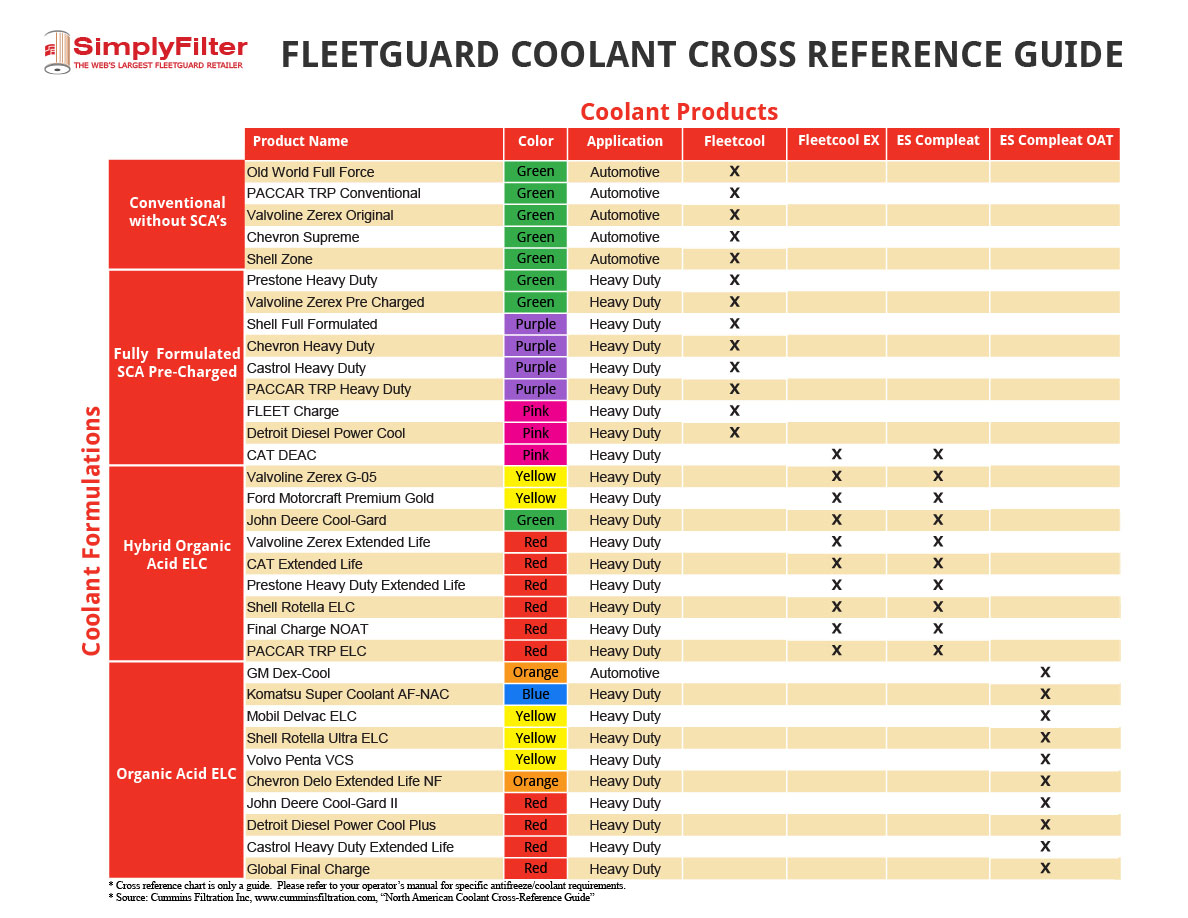Most fleet owners typically know all the details about their air, lube and fuel filtration systems, but often times the cooling system is forgotten. With research showing that up to 40% of catastrophic engine failures are related to improper cooling system maintenance, it's not enough to just hope you are choosing the correct coolant.
We've discussed the importance of coolant and other fluid analysis and now we'd like to help you choose the correct Fleetguard coolant. Check out our quick cross reference guide (click here to download a pdf or click the image to view it larger on your screen). Then continue reading below for more information.

A lot of people may just choose a coolant based on the color of the liquid. However, these colors are not always standard and the compositions can differ from manufacturer to manufacturer. It's better to make decision based on the coolant base and by its additive content. Read the descriptions below to understand which combination of characteristics are best for your application.
All Fleetguard coolants are compatible with all other coolants available and are suitable for use in all gasoline, diesel, and natural gas engines.
Coolant Base Types
Ethylene Glycol
EG based coolants are by far the most common because of their ability to be used in almost all climates. The drawback of EG is that it is toxic if ingested.
Propylene Glycol
PG coolants are typically used by customers who are looking for non-toxic coolant. It's safer to use and has a longer life than EG, but requires additives and testing of the PH level to maintain its effectiveness. PG is not as widely used as EG because it is more expensive and cannot be used in arctic climates.
Glycerin
Glycerin is made from renewable resources, and it's similar to PG in that it is non-toxic and is only suitable for moderate climates. Glycerin based coolants make up the smallest portion of the US market. Fleetguard offers a fully formulated hybrid coolant with Glycerin, ES Compleat Glycerin.
Coolant Additive Types
Conventional
This is the traditional coolant (antifreeze) and typically offers the lowest initial cost. However, conventional coolants have the shortest service intervals and shortest life, leading to a higher total cost of ownership. Using a conventional coolant can cost up 10 times more in the long run than using a more premium extended life coolant. Conventional coolants also have the added cost of supplemental coolant additives (SCA) and the manpower for testing and adding SCA. However, Fleetguard's Fleetcool does not require a pre-charge of SCA.
Hybrid
Hybrid coolants mix older additive technology with organic additive technology to provide extended service intervals and moderate initial investment. Hybrid coolants typically have a longer life and service interval than conventional coolants, but may have more maintenance requirements than OAT type coolants. They typically require SCA added back into the system at service intervals.
OAT
OAT coolants use the newest type of additive chemistry and will typically have the fewest maintenance requirements. OAT coolants are also more tolerant of system contamination than other coolant types and is the preferred coolant type of OEMs.
In heavy duty conditions, it's imperative to take the proper care in choosing and maintaining your coolant to keep your fleet running at its best. Fleetguard coolants are available in variations of the above options. For example, there is a Conventional EG and Hybrid EG. You can shop all cooling system products here.

